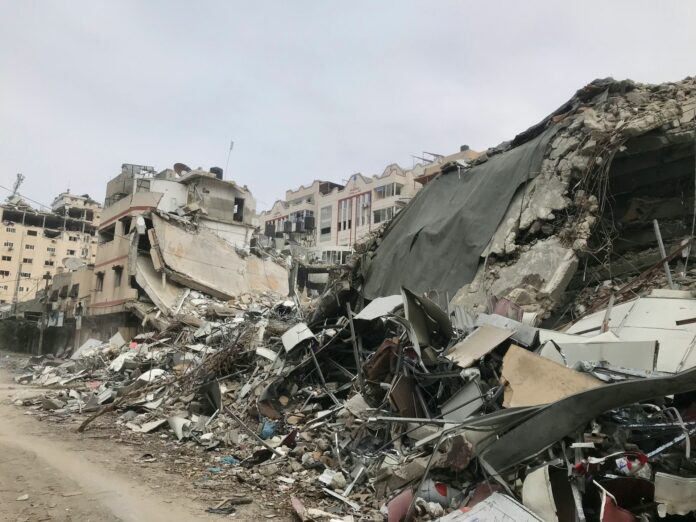The ceasefire proposal gains widespread support with key conditions for peace and reconstruction
The United Nations Security Council has voted in favour of a ceasefire plan for the Israel-Gaza conflict, proposed by the United States. This comprehensive plan outlines the steps needed for a “full and complete ceasefire,” including the release of hostages held by Hamas, the return of remains of deceased hostages, and the exchange of Palestinian prisoners.
In a decisive vote, 14 of the 15 Security Council members supported the US-drafted resolution, with Russia abstaining. The resolution confirms Israel’s acceptance of the ceasefire proposal and strongly urges Hamas to agree to it as well. This international backing, including endorsement from the G7 nations, adds significant pressure on both parties to adopt the plan and move towards ending the conflict.
US Secretary of State Antony Blinken recently met with several foreign leaders, including Israeli Prime Minister Benjamin Netanyahu, to rally support for the peace deal. Blinken emphasized that those desiring a ceasefire should pressure Hamas to consent to the plan.
Although Hamas has expressed partial support and welcomed the Security Council’s resolution, its political leaders in Doha have yet to formally respond. The plan’s final phase envisions a major reconstruction initiative for Gaza, which has suffered extensive destruction during the conflict.
The three-phase proposal begins with a hostage-prisoner swap and a short-term ceasefire. The second phase calls for a “permanent end to hostilities” and a full withdrawal of Israeli forces from Gaza. The third phase focuses on Gaza’s long-term reconstruction and development.
Despite President Biden announcing Israeli agreement to the plan, Netanyahu has not officially endorsed it. Internal divisions within Israel’s ruling coalition, highlighted by the recent resignation of Benny Gantz from the war cabinet, present challenges to unanimous support for the plan.
President Biden highlighted the resolution’s passage on social media, challenging Hamas to prove its commitment to peace. US Ambassador to the UN, Linda Thomas-Greenfield, hailed the vote as a step towards peace. Similarly, UK Ambassador Barbara Woodward and Foreign Secretary David Cameron called for both parties to seize this opportunity for lasting peace and stability.
The conflict, ignited by a Hamas attack on southern Israel on October 7, has resulted in approximately 1,200 Israeli deaths and over 37,000 Palestinian fatalities in Gaza, according to Hamas-run health ministry reports. The March resolution for a ceasefire, which the US did not veto, marks a significant shift in American policy towards linking ceasefire efforts with the release of hostages.
Analysis:
Political Impact
The Security Council’s endorsement of the US-led ceasefire plan represents a significant geopolitical development. It underscores a concerted international effort to de-escalate the Israel-Gaza conflict, promoting a structured pathway towards peace. Politically, this move may pressure regional leaders to engage more proactively in peace negotiations, potentially altering the dynamics within the Middle East. For the US, spearheading this initiative could bolster its diplomatic influence and reaffirm its commitment to mediating international conflicts.
Social Reflection
This ceasefire plan reflects a global consensus on the urgent need to address humanitarian crises and promote peace. The widespread support highlights a collective acknowledgement of the severe human toll the conflict has taken on both Israelis and Palestinians. The call for a ceasefire and subsequent reconstruction efforts mirrors a growing international demand for sustainable solutions to protracted conflicts, emphasizing the importance of human rights and security.
Psychological Aspect
The ceasefire proposal and its potential implementation bring hope and relief to the conflict-affected populations. The psychological impact on civilians, who have endured extreme stress and trauma, could be profound, offering a pathway to recovery and normalcy. The release of hostages and prisoners, integral to the plan, also carries significant emotional weight, potentially fostering reconciliation and healing among affected families.
Sociological Angle
Sociologically, the ceasefire plan underscores the role of international bodies in conflict resolution and the importance of collaborative efforts to achieve peace. The involvement of the UN and the G7 nations highlights the global community’s responsibility towards stabilizing volatile regions. Additionally, the proposed reconstruction plan for Gaza addresses long-term socio-economic challenges, aiming to rebuild and improve living conditions, thereby contributing to regional stability and development.
Fashion Culture
While not directly linked to fashion, the ceasefire plan could influence cultural expressions and public sentiment within affected communities. Periods of peace often lead to cultural revitalization, including fashion, art, and local traditions, reflecting a society’s resilience and hope for a better future. The emphasis on reconstruction and development might also inspire new trends and cultural movements centred around themes of rebuilding and renewal.
